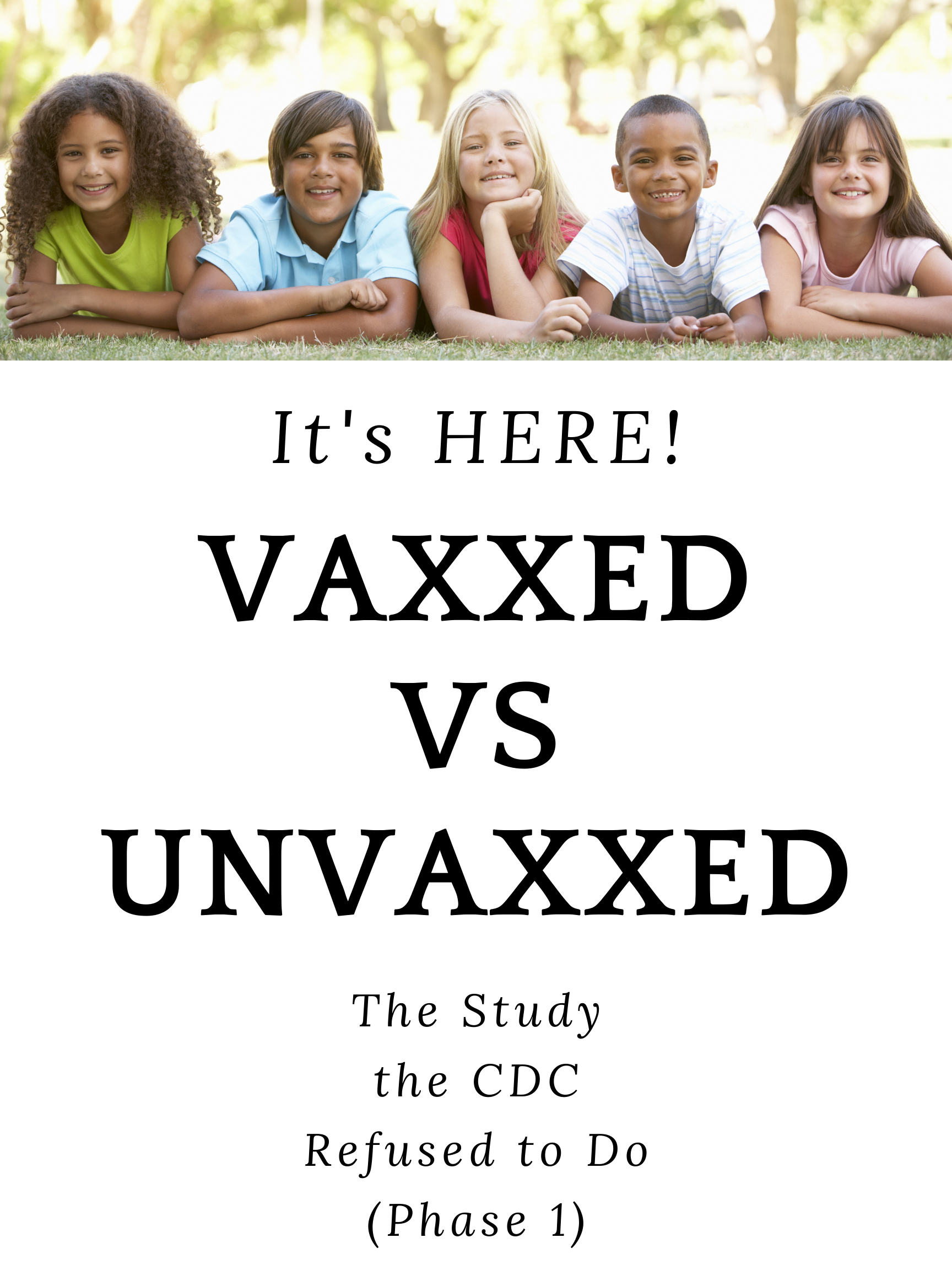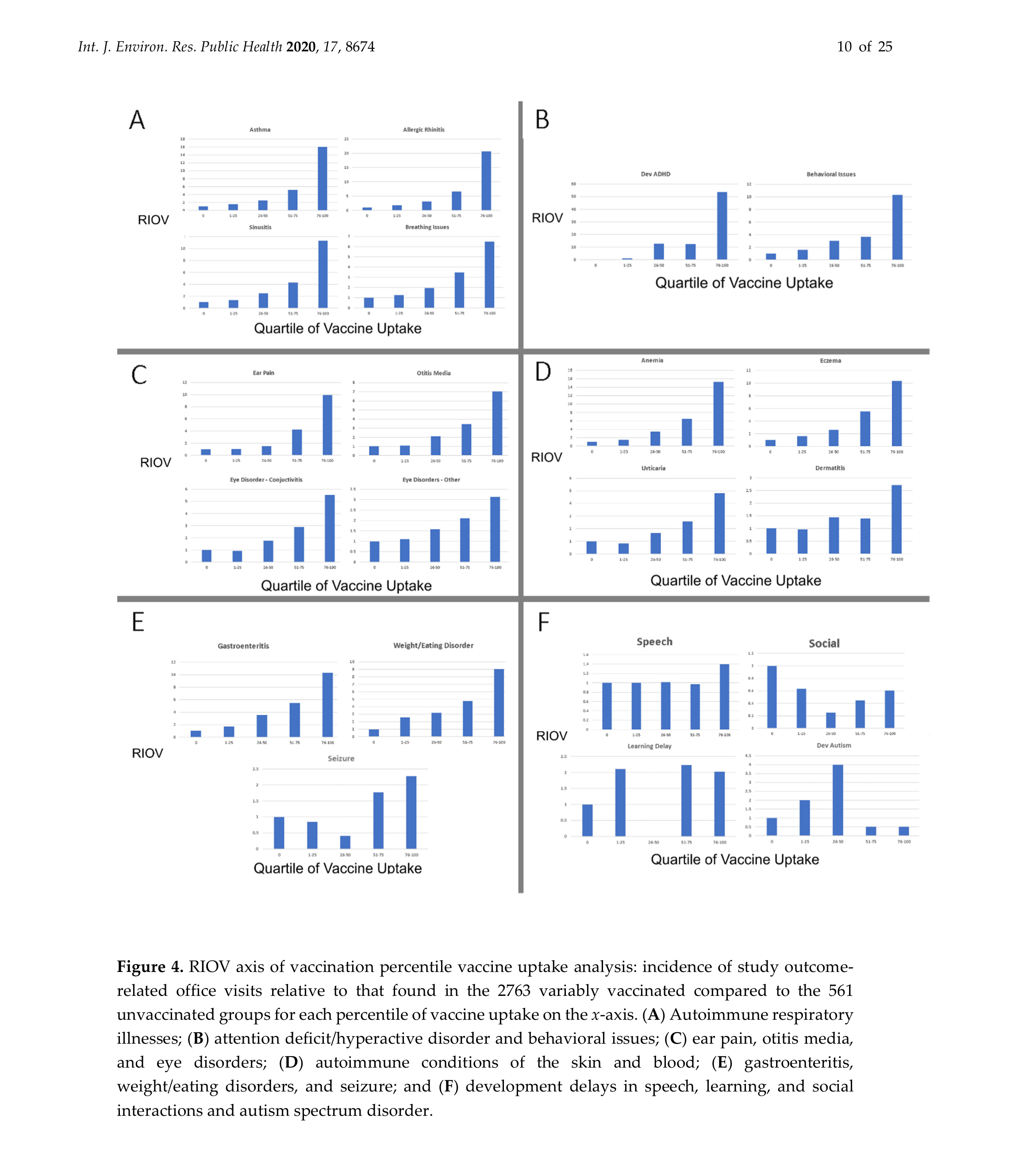
The public has been demanding a vaccinated vs unvaccinated study for decades.
The CDC has steadfastly refused to fund or conduct such a study.
In 2019, Informed Choice WA members proudly joined the grassroots effort to fund the IPAK 2019 Vaxxed/Unvaxxed Study. The Institute for Pure and Applied Knowledge (IPAK) is a not-for-profit organization which exists to perform scientific research in the public interest. IPAK is funded by people, LIKE YOU, not pharmaceutical companies.
On November 22, 2020, the study was published in the International Journal of Environmental Research and Public Health.
FULL STUDY below.
About This Landmark Study
by Andre Angelantoni
This is a landmark paper as it compares whole-health outcomes of fully vaccinated vs unvaccinated children [1].
Background: There are pediatric offices around the country that give parents the choice as to which vaccines to give their child. The CDC schedule calls for about 72 vaccines between pre-birth (up to three vaccines given to the pregnant mother) to age 18. About 60% of them contain aluminum salts which are toxicants (“poisons”) added to the vaccines to cause the body to react to the antigen. The antigen is the active part of the vaccine such as the virus or bacterium. Without the aluminum salt, if the antigen happens to be dead, the body will simply ignore it. Live vaccines such as the MMR do not require aluminum salts. We now know that aluminum salts are biopersistent and cumulative. In other words, they travel all over the body and we inject them at a faster rate than children can excrete them, via the vaccination program.
If one wants to understand whether children are overall more healthy with all these immunomodulatory drugs (a fancy way of saying “a drug that modifies the immune system”) than without them, the obvious study to perform is to check the health status of 100% vaccinated kids against those kids who have received zero vaccines.
Why do we want to know this? The potential damage these drugs are doing is enormous because the immune system is tightly integrated with every other system in the body, including with the nervous system—and that includes the brain. The dilemma of vaccinating children is that we want to protect them because their immune systems are not yet fully developed—yet activating the immune system of a child’s delicate developing brain is very risky.
Here is how the noted medical textbook Kuby’s Immunology explains it:
“the immune system is also much more than an isolated component of the body, merely responsible for search-and-destroy missions. In fact, it interleaves with many of the other body systems, including the endocrine, nervous, and metabolic systems, with more connections undoubtedly to be discovered in time.” [2]
So far, the public health strategy has been to vaccinate as much as the government health agencies want, with no limit. Moreover, the CDC refuses to perform this comparative study, and four bills in Congress that would have forced them to perform this study have all failed:
H. R. 2832 2007 https://www.congress.gov/…/110th…/house-bill/2832/text
H.R. 1757 (113th): Vaccine Safety Study Act 2013 https://www.govtrack.us/congress/bills/113/hr1757/text
H.R.1636 – Vaccine Safety Study Act (2015-16) https://www.congress.gov/bill/114th-congress/house-bill/1636
H.R.3615 – Vaccine Safety Study Act (2017-2018) https://www.congress.gov/bill/115th-congress/house-bill/3615
Note that the pharmaceutical industry is the second largest donor to politicians (in dollar amount) after the insurance industry and before the oil and gas industry [3].
There is a pediatric practice in Oregon that for the last 30 years has respected the fundamental and critical need for fully informed medical consent, and also respected the individual health circumstances and needs of each of its young patients. Because of this, the practice has medical records on children ranging from those vaccinated per the CDC schedule to children not vaccinated at all. Thus, we have a population we can use to compare.
What did the study find? In every measure examined, the fully vaccinated children had more problems than the completely unvaccinated children: more ear infections, more brain damage, more allergies, more dermatitis, more respiratory infections, more eczema—more everything. One category, ADHD, showed **zero** cases in the unvaccinated cohort vs the fully vaccinated cohort.
As mentioned earlier, activating the immune system of the delicate developing brain is risky and aluminum salts travel around the body. We are discovering this aluminum in children’s brains. Aluminum is only slightly less toxic than mercury and possibly on par with lead.
Now you may understand why millions of people are saying that the vaccination program, in creating the sickest generation this nation has ever known, is driving the sales of other pharmaceutical products to the tune of 4.5 billion prescriptions per year. It’s not our imagination: Americans really are sicker than other countries and they also are one of the most vaccinated populations on the planet. Because of the censorship of anything critical of vaccination, and the complete lack of financial incentive to improve safety of either the products or how and when they are administered, we are damaging every single child to some degree, giving them symptoms that start them on the road to being lifetime pharmaceutical customers.
The authors are now moving on to Phase 2 of their study, which they describe as being focused “on the comparison of health outcomes associated with live vs. non-live vaccines, aluminum-containing vaccines vs. non-aluminum containing vaccines, as well as studying the impact of individual vaccines on specific health outcome risks.”
[1] Relative Incidence of Office Visits and Cumulative Rates of Billed Diagnoses Along the Axis of Vaccination
https://www.mdpi.com/1660-4601/17/22/8674
[2] Kuby’s Immunology—7th Edition, p.1
[3] Pharmaceuticals / Health Products
https://www.opensecrets.org/industries/indus.php…
KEY FINDINGS
Overall, the more vaccines a child received, the higher the incidence of health issues, ranging from asthma to weight disorders.
 The authors noted that the pediatric practice had rates of developmental disorders far lower than national rates, and they say that may be because of the individualized nature of their care.
The authors noted that the pediatric practice had rates of developmental disorders far lower than national rates, and they say that may be because of the individualized nature of their care.
“Developmental disorders were determined to be difficult to study due to extremely low prevalence in the practice, potentially attributable to high rates of vaccine cessation upon adverse events and family history of autoimmunity. Remarkably, zero of the 561 unvaccinated patients in the study had attention deficit hyperactivity disorder (ADHD) compared to 0.063% of the (partially and fully) vaccinated. The implications of these results for the net public health effects of whole-population vaccination and with respect for informed consent on human health are compelling. Our results give agency to calls for research conducted by individuals who are independent of any funding sources related to the vaccine industry. While the low rates of developmental disorders prevented sufficiently powered hypothesis testing, it is notable that the overall rate of autism spectrum disorder (0.84%) in the cohort is half that of the US national rate (1.69%). The practice-wide rate of ADHD was roughly half of the national rate. The data indicate that unvaccinated children in the practice are not unhealthier than the vaccinated and indeed the overall results may indicate that the unvaccinated pediatric patients in this practice are healthier overall than the vaccinated.”
Lyons-Weiler, J.; Thomas, P. Relative Incidence of Office Visits and Cumulative Rates of Billed Diagnoses Along the Axis of Vaccination. Int. J. Environ. Res. Public Health 2020, 17, 8674.
IPAK needs your help to fund PHASE 2. Please consider becoming an IPAK Science Hero and make the world a safer place for our children through objective science.
FULL STUDY
 Loading...
Loading...

 The authors noted that the pediatric practice had rates of developmental disorders far lower than national rates, and they say that may be because of the individualized nature of their care.
The authors noted that the pediatric practice had rates of developmental disorders far lower than national rates, and they say that may be because of the individualized nature of their care.